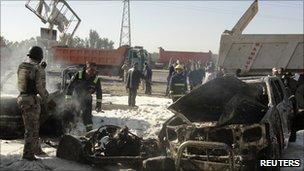Violent deaths in Iraq fall 'but at slower rate'
- Published

The number of civilians killed by violence in Iraq in the past year was the lowest since the 2003 US-led invasion, a rights group has said.
Iraq Body Count (IBC), which collates casualty reports, said deaths dropped by 15% from 2009 to just under 4,000.
It said two bombs exploded each day on average, each killing four people.
But the group warned the number may have reached an "impassable minimum", and that civilians were likely to die at a similar rate for years to come.
In its annual report, IBC said 3,976 people had died violently in Iraq over the past year, compared to 4,680 in 2009. Of the 2010 deaths, 66% were caused by insurgent bomb attacks.
The capital Baghdad and the northern city of Mosul were the worst affected areas.
"After nearly eight years, the security crisis in Iraq remains notable for its sheer relentlessness: 2010 averaged nearly two explosions a day by non-state forces that caused civilian deaths," IBC said.
"As well as occurring almost daily, these lethal explosions can happen almost anywhere, with 2010's attacks occurring in 13 of Iraq's 18 administrative regions."
'Persistent conflict'
IBC said that a marked fall in the rate of deaths after the US forces ended their combat mission on 31 August was "somewhat more hopeful".
The date was "followed by an immediate halving in the number of civilian deaths between August and September, and lowered levels have continued into the winter months", it said.
But while the number of deaths has continued to fall since a peak in 2006 and 2007, the rate of decline has also dropped, from 50% and 63% in previous years.
IBC said that while any reduction in the rate of violence was welcome, "the slowdown in reductions is indicative of an impassable minimum that may have been reached".
"Taken as a whole and seen in the context of immediately preceding years, the 2010 data suggest a persistent low-level conflict in Iraq that will continue to kill civilians at a similar rate for years to come."
A total of 4,470 coalition military personnel have died in Iraq since 2003.
The BBC's Jim Muir in Baghdad says that while no-one can claim to have wholly accurate figures on civilian deaths in Iraq, IBC has established itself as probably the most respected and quoted source on this very controversial issue.
Its annual review comes as a reminder, our correspondent adds, that while levels of violence have come down sharply, people are still being killed here every day.
IBC arrives at its figures by cross-checking media reports or body discoveries with eyewitness accounts and interview with officials and medical or morgue workers.
Overall, the group says 108,398 Iraqis have died in violence since 2003. The figures are much higher than those reported by the Iraqi government.
But IBC says an initial analysis of data in secret US military document released by Wikileaks indicate another 15,000 civilian deaths could be added to the count.
Other reports and surveys have resulted in a wide range of estimates of Iraqi deaths. The UN-backed Iraqi Family Health Survey estimated 151,000 violent deaths in the period March 2003 - June 2006.
Meanwhile, The Lancet journal in 2006 published an estimate of 654,965 excess Iraqi deaths related to the war of which 601,027 were caused by violence.
Both this and the Family Health Survey include deaths of Iraqi combatants as well as civilians.